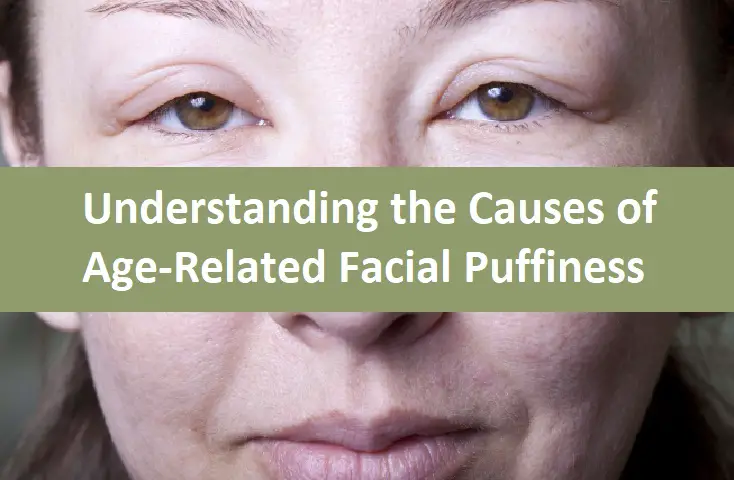As we age, our skin inevitably begins to show signs of aging. One such sign is facial puffiness, which can be highly concerning for those wondering why my face is puffy as I age. Fortunately, there are a few possible causes of this condition that can be addressed with lifestyle changes or through medical intervention. In this blog post, we’ll explore the underlying causes of age-related facial puffiness and offer some insights on how to manage it.
Explaining Age-Related Facial Puffiness
Facial puffiness is generally caused by a combination of factors, including lower levels of collagen and elastin as we age, reduced skin elasticity, and water retention. Our skin’s ability to retain moisture decreases over time, resulting in dryness that can contribute to the appearance of sagging or puffy skin.
Additionally, as our bodies produce fewer hormones, such as estrogen and testosterone, circulation is reduced, leading to a decrease in blood flow that can cause the skin to become puffy.
Finally, fat accumulation beneath the skin may also be responsible for age-related facial puffiness. When our metabolism slows down due to advancing age, it can lead to fat deposits that create a puffier appearance.
Factors That Cause Facial Puffiness
Hormone Disbalance as You Age
As we age, our hormone levels naturally decline. This includes both male and female hormones that regulate the body’s water balance, which can cause facial puffiness. Hormonal imbalances, such as those caused by menopause or thyroid disorders, can also lead to water retention and puffiness in the face.
Poor Diet and Dehydration
Eating a diet high in unhealthy fats, sodium, processed foods, and refined sugars can impair the body’s ability to process water, leading to dehydration and fluid retention in the face.
Stressful Lifestyle
Stress can cause the body to produce hormones that lead to water retention, resulting in a puffy face. Additionally, lack of sleep and not taking time to relax can also contribute to dehydration, causing puffiness and dark circles beneath the eyes.
Increased Consumption of Caffeine and Alcohol
Caffeine and alcohol are diuretics, meaning that they dehydrate the body and reduce water retention. Over-consumption of either of these substances can cause the body to become overly dehydrated, leading to puffiness in the face.
Age Changes in Face Structure
As we age, our facial features tend to change. This includes thinner skin and the loss of fat in certain areas of the face that can make it appear puffier. Additionally, the downward pull of gravity on our facial features can contribute to a puffy appearance as we age.
Ways of Treating Facial Changes as You Get Older
Fortunately, there are a few ways to address age-related facial puffiness.
Facelift Surgery
A facelift is a cosmetic surgery that can help reduce the appearance of sagging skin, wrinkles, and puffiness. The surgery involves tightening the skin and underlying muscles, resulting in a smoother, more youthful appearance.
Laser Treatments
Laser treatments can also help reduce the appearance of puffiness by stimulating the production of collagen and elastin to firm up the skin.
Proper Hydration
Staying hydrated by drinking plenty of water is essential for keeping your skin looking and feeling healthy.
Botox Injections
Botox injections can help diminish wrinkles and lines in the face that cause a puffier appearance.
Use Sun Protection
Protecting your skin from the sun with sunscreen can help reduce wrinkles and other signs of aging that contribute to a puffy appearance.
Use Moisturizers
Using a moisturizer specifically formulated for your skin type can help keep the skin hydrated and reduce puffiness.
Maintain a Healthy Diet
Eating a balanced diet that includes plenty of fresh fruits, vegetables, and proteins can help keep your skin looking healthy and glowing.
Physical Activities
Regular exercise can improve circulation and help reduce the appearance of facial puffiness.
Conclusion
Facial puffiness can be caused by a variety of factors, including hormonal imbalances, poor diet and dehydration, stress, increased consumption of caffeine and alcohol, and age-related changes in facial structure and skin tone.
Fortunately, there are ways to address these issues, such as facelift surgery, laser treatments, proper hydration, Botox injections, sun protection, moisturizers, and a healthy diet.
By following these tips and taking good care of your skin, you can help reduce the appearance of facial puffiness and keep your skin looking youthful and radiant.

Morgan Elfman is a compassionate writer, dedicated caregiver, and passionate advocate for senior well-being. Born and raised with a deep sense of empathy and a natural inclination towards service, Morgan has devoted her life to making a positive impact on the lives of seniors.
As a writer for www.choiceseniorlife.com, Morgan utilizes his skills to create insightful and informative content that addresses the unique needs and challenges faced by seniors and their families. Her articles not only provide valuable information on health, lifestyle, and care options but also strive to inspire and empower seniors to lead fulfilling lives.
